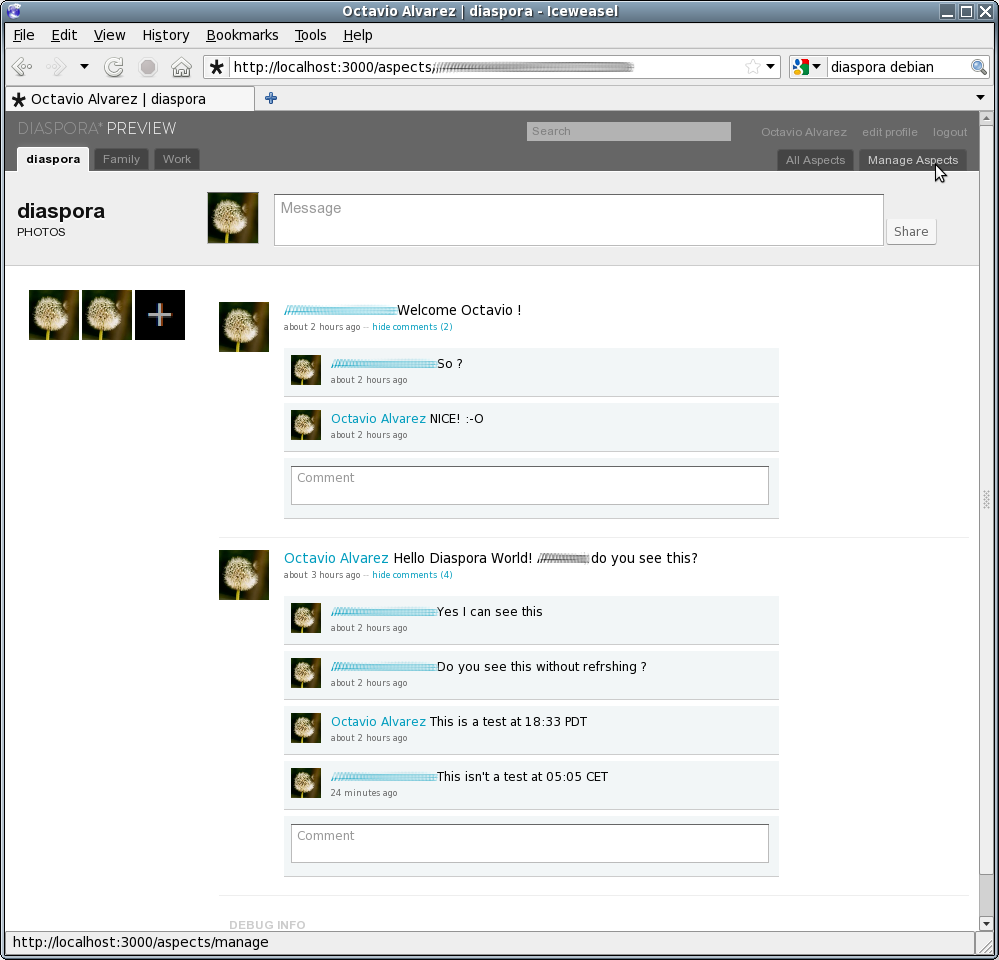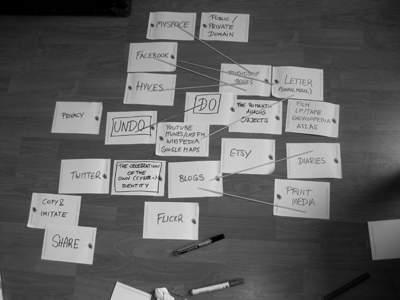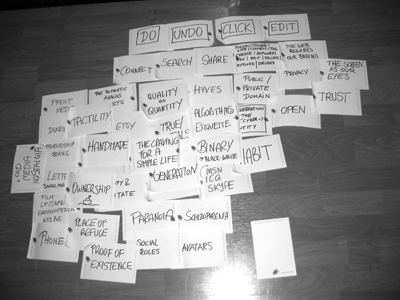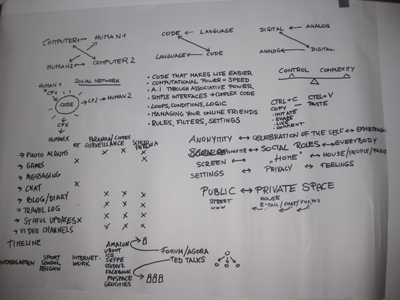User:Birgit bachler/Final Project Proposal: Difference between revisions
No edit summary |
No edit summary |
||
| Line 54: | Line 54: | ||
22.10.2010<br /> | 22.10.2010<br /> | ||
In my tutorial with Olia I reflected on my first year's projects at Piet Zwart Institute. <br />My projects could be described through these three keywords: | In my tutorial with Olia I reflected on my first year's projects at Piet Zwart Institute. <br />My projects could be described through these three keywords: | ||
'''Remediation - Augmentation - Mapping''' | '''Remediation - Augmentation - Mapping'''<br /> | ||
In my mind-mapping process these keywords continued popping up: | In my mind-mapping process these keywords continued popping up: | ||
Network-types - Data Overload - Online/Offline - Analog/Digital - Public/Private Space | '''Network-types - Data Overload - Online/Offline - Analog/Digital - Public/Private Space''' | ||
<div style="column-count:2;-moz-column-count:2;-webkit-column-count:2"> | <div style="column-count:2;-moz-column-count:2;-webkit-column-count:2"> | ||
I am interested in data and the contemporary overload of information and the ongoing development of (mainstream) network cultures. For my research I would like to focus on different types of networks, online and offline, temporary or stable and how they function. Whether these networks cultivate our social behavior or represses it. In what way the necessity to be always connected, categorized and tagged influences our everyday behavior. Where analog equivalents of social network behavior can be found or how the information overload can be made visible offside computer statistics. <br /> I would like to research and explore the discrepancy between personality and profile, the profile as a personal self-reflection or possible personality-correction. The channel online-offline seems to become more and more of a gray zone (who are your friends? can you say you know a city when having seen it on google maps/street view?) and also truth and fake become more and more convertible. Where is the position of a person with human limitations ("Our mind is centralized to only one body and that really sucks" - Rui Guerra) within a huge, seemingly endless network without technical restrictions and innumerable possibilities? | I am interested in data and the contemporary overload of information and the ongoing development of (mainstream) network cultures. For my research I would like to focus on different types of networks, online and offline, temporary or stable and how they function. Whether these networks cultivate our social behavior or represses it. In what way the necessity to be always connected, categorized and tagged influences our everyday behavior. Where analog equivalents of social network behavior can be found or how the information overload can be made visible offside computer statistics. <br /> I would like to research and explore the discrepancy between personality and profile, the profile as a personal self-reflection or possible personality-correction. The channel online-offline seems to become more and more of a gray zone (who are your friends? can you say you know a city when having seen it on google maps/street view?) and also truth and fake become more and more convertible. Where is the position of a person with human limitations ("Our mind is centralized to only one body and that really sucks" - Rui Guerra) within a huge, seemingly endless network without technical restrictions and innumerable possibilities? | ||
</div> | </div> | ||
Revision as of 23:17, 23 October 2010
Sketchbook Final Project
Wed, Sep 29 2010
I wish to continue with some of the research I have been doing the first year around social networks, personalization, public/private data and spaces, continuing with an improved version of the soundbook-project from the 2nd Thematic Project. Here are the keywords that randomly come up in order to find the way towards a more formulated idea: tactility, physicality, non-digital networks, drawing/writing circuits, books as a souvenir, handwriting, decay of analogue media, hacking the format of the codex, friendship-books, diaries, postcards, the digitalization of the human mind (reading, writing habits, notes, thoughts), control and centralization of knowledge/history... [to be continued with more clarity and a fancy diagram]
Mon, Oct 4 2010
- Look at mail-art & fluxus
- google for mobile phone, console joypad, thumbs, fingers & Japan
- bit-rot & bit-decay
- the constraint of discreet environments
- jstor databases
- generational issues
- http://pluto.kuri.mu/
- http://www.naipublishers.nl/art/open19_e.html book: open
More Links/References
http://www.theshallowsbook.com/nicholascarr/The_Shallows.html
http://www.wired.com/magazine/2010/05/ff_nicholas_carr/all/1
http://www.amazon.co.uk/gp/product/0141018682/ref=cm_cd_asin_lnk
http://www.scam-detectives.co.uk/blog/2010/01/22/interview-with-a-scammer-part-one/ http://www.neural.it/art/2010/10/enphonic_graphomania_the_visua.phtml
- Computers transporting and mediating human interaction alter our interpersonal communication
- Our perception of privacy and openness shifts through the structure and demands of social networks
- Social networks make us their products
- Social networks makes everyone our "friend" and gives us the only choice to "like" things
- Standardization, customization, protocol, efficiency, debugging
- The craving for a simple life, the romantization of analog media
- Networks that result from linking mismatches
- Networks that stimulate the inimitability & singularity of their users/nodes
- Networks that do not require a complete profile
- Networks that do not require sustainable connections
- Networks that arise from the decay of other networks (e.g. mobile phone network collapses, Dutch train network + snow)
- Networks that do not operate in realtime (toilet scribbles, telephone answering machines, trash)
- Physical networks (architectural, geographical, natural...)
- Temporary networks in state of emergency (e.g. volcanic eruption)
- (Social) Networks that are built by human-to-human interaction only
18.10.2010 Aymeric:
- http://thenoisychannel.com/2010/07/08/paul-adamss-presentation-on-social-networking/
 Diaspora, aspects
Diaspora, aspects- Revisionism (Marxist, Orwellian)
22.10.2010
In my tutorial with Olia I reflected on my first year's projects at Piet Zwart Institute.
My projects could be described through these three keywords:
Remediation - Augmentation - Mapping
In my mind-mapping process these keywords continued popping up:
Network-types - Data Overload - Online/Offline - Analog/Digital - Public/Private Space
I am interested in data and the contemporary overload of information and the ongoing development of (mainstream) network cultures. For my research I would like to focus on different types of networks, online and offline, temporary or stable and how they function. Whether these networks cultivate our social behavior or represses it. In what way the necessity to be always connected, categorized and tagged influences our everyday behavior. Where analog equivalents of social network behavior can be found or how the information overload can be made visible offside computer statistics.
I would like to research and explore the discrepancy between personality and profile, the profile as a personal self-reflection or possible personality-correction. The channel online-offline seems to become more and more of a gray zone (who are your friends? can you say you know a city when having seen it on google maps/street view?) and also truth and fake become more and more convertible. Where is the position of a person with human limitations ("Our mind is centralized to only one body and that really sucks" - Rui Guerra) within a huge, seemingly endless network without technical restrictions and innumerable possibilities?



